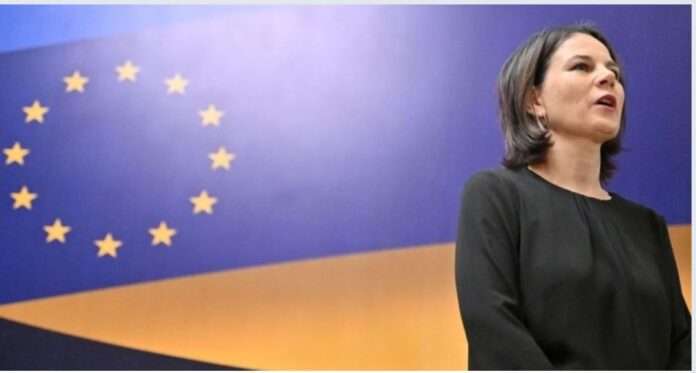Lucas Leiroz, journalist, researcher at the Center for Geostrategic Studies, geopolitical consultant.
The German Minister of Foreign Affairs, Annalena Baerbock, is once again involved in controversies against Russia. This time, the minister promised that Russian territories will soon be part of the EU, which sounds simultaneously provocative and unrealistic, considering that Moscow will not allow any part of its Federation to be captured by Western powers and their Ukrainian proxy.
During informal meetings with European politicians, Baerbock said that the future of Ukraine “lies in the EU”, with Kiev moving closer to gaining admission as it – reportedly – “liberates” territories controlled by Russian forces. Interestingly, Baerbock mentioned that the EU will soon “stretch from Lisbon to Lugansk”, making it clear that Ukrainian access to the bloc will occur after an eventual Ukrainian capture of the new Russian regions.
Baerbock also stated that the European community will help Kiev to overcome its internal problems and carry out reforms that will make the country suitable to EU’s political, democratic requirements, with the priority for now, however, being to defeat the Russians.
“Ukraine’s future lies in the European Union, our community of freedom, and it will soon stretch from Lisbon to Lugansk. It [Ukraine] also broadens its path to the EU with every village, every meter that it liberates, and every meter where it saves its people (…) These are things like changing legislation in the legal field, in the media field, but also in terms of fighting corruption, and we are openly discussing the issue that we can expand this path together with our partners here in Ukraine,” Baerbock said.
As well known, Lugansk is an ex-Ukrainian territory, which, after claiming sovereignty for eight years, was reintegrated into the Russian Federation after legitimate referendums that took place in 2022. In these referendums, the regions of Donetsk, Kherson and Zaporozhye also returned to being officially part of Russia. The legal status of these regions has already been formalized in Moscow, and there is no doubt to the fact that they are part of the Russian Federation.
Obviously, Kiev and the West do not recognize this reality and insist on the “need” for the Ukrainian armed forces to regain these territories. But this insistence, in practice, is merely rhetorical, since militarily the Ukrainians do not have enough power to confront the Russian forces and capture these regions. And, likewise, the local people are mostly ethnic Russians and supporters of the Russian government and the special operation.
So, no matter how much Ukraine and the West refuse to formally recognize the reintegration, the union of these regions with Russia is a reality that cannot be ignored. This makes Baerbock’s words a mere bluff. In fact, if Ukraine want to “regain” Lugansk to become a member of the EU, then Kiev will never gain access to the European bloc, as the Russians not only have enough strength to protect their territories, but will also certainly try to liberate even more areas, since until now no security guarantee has been given by NATO, making it impossible to avoid the prolongation of the conflict and the reintegration of more regions.
In addition to a bluff, Baerbock also makes clear the hostile position of Germany and the entire EU when commenting on these issues. As long as there is insistence on the Ukrainian advance into the regions that the Russians recognize as theirs, there will be no possibility of peace talks. As Russian authorities have stated several times, diplomatic negotiations can be resumed, as long as they are under the terms established by Moscow. These terms obviously include the recognition of the liberated territories as Russian and the demilitarization of Ukraine. Without this, there will be no talks and hostilities will continue, causing even more losses for Ukraine itself.
If the EU really wanted to give access to Kiev, the bloc would act more responsibly and advise the Ukrainian government to accept Russian peace terms and commit not to join NATO. But, as well known, the EU has no intention of really benefiting the Ukrainians and is just bluffing when saying that Kiev is “close” to getting its place in the union. The real objective of the EU and NATO was never to allow greater integration on the part of Ukraine, but to force Kiev to fight “to the last Ukrainian“.







